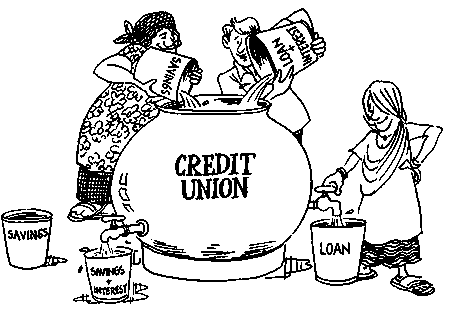 In order to compete in a corporations-dominated economy, worker cooperatives need millions of dollars to finance large-scale businesses in manufacturing and production.
In order to compete in a corporations-dominated economy, worker cooperatives need millions of dollars to finance large-scale businesses in manufacturing and production.
"That's the hole in the cooperative movement which there needs to be some infrastructure for," said Michael Leung, of Somerville, MA, who last year earned a doctorate in Physics from Princeton University. "I don't personally see a way where co-ops have the mechanism for large-scale growth."
One strategy to make this happen: A large "participatory" credit union that would provide loans to start and to expand worker-owned, democratically run co-ops. "My main interest is industry and production," he said.
In this sense, "participatory" means the members would make policy and decisions, such as the participatory budgeting that started in Brazil 10 years ago, where community members decide how local government spends tax money. The movement spread to Argentina, Venezuela and elsewhere in Latin America, as well as London and even places like the Twin Oaks Community near Louisa, VA. It has resulted in many innovative initiatives that take care of citizen needs.
"As far as I know, the cooperative is the most effective way to fight corporate power," said Leung. Capitalists "can't make money off of co-ops because of the democratic structure,"he said. Leung has no prior experience organizing a credit union, but is undeterred because he is confident that people with the skills and experience will be recruited. His hope is that if workers find they can have democracy at work, then they will also see they can have democracy in their government.
Leung has a passion for human rights, but believes the U.S.'s role as a major culprit in human rights abuses across the planet stem from its struggle to maintain economic hegemony in the world. The best way to meet the basic needs of the majority of the world's people - clean water and food, literacy, health care and housing - is to build local economic power. Leung argues that the goal in the U.S. is to build a national economic infrastructure rooted in worker-owned and -managed cooperatives.
But as Leung sees it, starting cooperatives is not feasible for the working class. This is because the vast majority of workers generally do not have the financial resources to put into starting the kind of businesses that can compete effectively with large corporations, and also because of corporations' undue influence over the lives of most people in society.
What's needed, Leung believes, is a financial institution whose sole aim is to serve the cause of worker cooperative movement. According to Leung, the goals of the participatory credit union would be to:
Produce empowering, well-paying jobs in democratic workplaces by
providing loans to start cooperatives;Operate with a high degree of democratic management with
member involvement in both policy formation and decisions;Provide all members with training in self-management, finance, large-
scale economic coordination, participatory economics, workplace
democracy and specialized skills;Provide cooperative employment opportunities in all sectors of economy;
Build the capacity to offer employment to seven million unemployed, and
tens of millions of low wage or underemployed workers below the poverty
line;Build skills, self-confidence, and a sense of personal responsibility
among the working class;Remove/reduce the influence of owners, managers, and the coordinator class by giving democratic decision-making powers to all workers.
Leung estimates that it will take at least $300,000 to organize a full service credit union with the same services as a traditional bank. This estimate, based on information from the National Credit Union Administration, includes operating costs for several months, computer equipment, consulting fees and office space, he said.
 Leung has begun talks with several of the existing co-op loan funds: ICA/Local Enterprise Assistance Fund in Boston, the Cooperative Fund of New England, the North Country Co-op Development Fund and the North County Cooperative Federal Credit Union in Minneapolis, as well as Ownership Associates in Cambridge. He is looking for background information and experience about what has been tried, and hopes to find many people interested in the project.
Leung has begun talks with several of the existing co-op loan funds: ICA/Local Enterprise Assistance Fund in Boston, the Cooperative Fund of New England, the North Country Co-op Development Fund and the North County Cooperative Federal Credit Union in Minneapolis, as well as Ownership Associates in Cambridge. He is looking for background information and experience about what has been tried, and hopes to find many people interested in the project.
He said he has also approached the United States Federation of Worker Cooperatives, the newly founded trade association for worker cooperatives and other employee-owned businesses. Cooperatives may share the "common bond" that is required to organize a credit union. A common bond is a factor such as membership association, geography, or company affiliation that credit union members must have in common.
Organizing the credit union is expected to be no easy task. Obstacles include raising $300,000 for the chartering costs, assembling a team with banking expertise to found the credit union and recruiting 3,000 credit union charter members. Once founded, "the credit union [will also need] people with expertise to find areas (industries) where co-ops can succeed," Leung said. "I see this as a very long term project."
For information, write: participatory.credit.union (at) gmail.com.

Add new comment